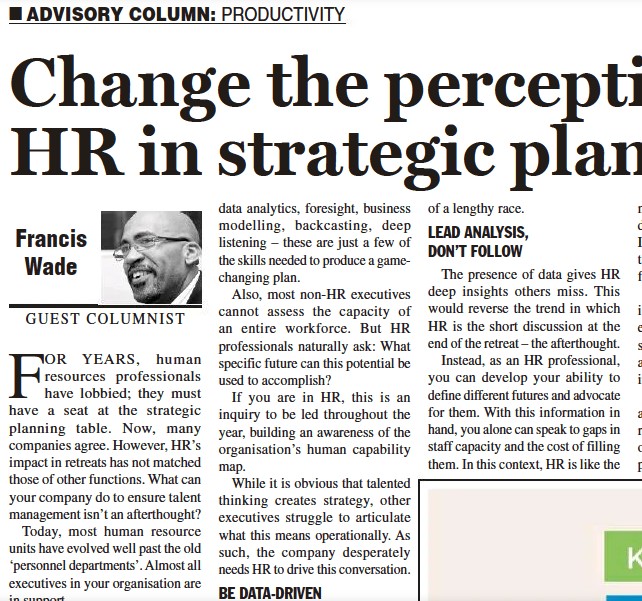For years, HR Professionals have lobbied: they must have a seat at the strategic planning table. Now, many companies agree. However, HR’s impact in retreats has not matched those of other functions. What can your company do to ensure talent management isn’t an after-thought?
Today, most Human Resource units have evolved well past the old “Personnel Departments”. Almost all executives in your organization are in support.
But it’s not enough. In two decades of facilitating strategic planning retreats, I have noticed a trend. The least effective participants are often HR Professionals.
I don’t say this lightly. Nor would I apply my observation to every situation I have encountered. But there is definitely a recurring pattern of behavior.
For example, when the HR Director makes his/her presentation, colleagues regularly stop paying attention. To them, nothing earth-shattering will be shared. They relax, sometimes get bored and may even leave the room altogether for busywork.
Also, from start to finish, the HR manager is likely to be the most quiet person. Sometimes, he/she could come alive near the very end, but it’s too little too late.
Instead of missing the chance, how can you ensure HR steps up from the first minute?
- Be Strategic Before the Retreat
In general, many executives bemoan the fact that HR is too reactive. While this is a criticism, it translates to a great opportunity for improvement. For example, HR can establish itself at the forefront of strategic questions between retreats, perhaps focusing on the potential of human capital.
The truth is, there is no such thing as a wildly successful strategy that doesn’t involve human creation and execution. It’s not luck. Ingenuity, data analytics, foresight, business modelling, backcasting, deep listening – these are just a few of the skills needed to produce a game-changing plan.
Also, most non-HR executives can’t assess the capacity of an entire workforce. But HR professionals naturally ask: “What specific future can this potential be used to accomplish?”
If you’re in HR, this is an inquiry to be led throughout the year, building an awareness of the organization’s human capability map.
While it’s obvious that talented thinking creates strategy, other executives struggle to articulate what this means operationally. As such, the company desperately needs HR to drive this conversation.
- Be Data-Driven
Whereas a CFO is trained to think in terms of numbers, the same isn’t usually true of HR. As such, reviews of past financial results take up an inordinate amount of time. However, they are all about a history, telling stories about what has already happened.
By contrast, HR professionals can be all about the future. But you must use numbers to describe it.
Unfortunately, in the heat of the moment at a retreat, HR’s lack of data forces it into vague, qualitative measures which colleagues have a hard time grasping.
In a prior column in Nov 2021, I argued that CEOs and other executives are upset at this fact. They want HR to catch up to the analytics train, but it’s not for charity’s sake.
Unfortunately, only a tiny fraction of CEOs, Chairpersons and MDs have HR backgrounds. Even though most of their work involves people, these skills only become important late in their careers.
As such, they need HR analytics and dashboards, tools and summaries to appreciate what’s happening with their people. Sadly, most HR managers don’t give them what they want.
If you’re an HR Professional, consider becoming data-driven long before the retreat so that you can shine in the event. I have seen it done to great effect and the result was stunning.
In this context, a retreat is more like the grand finale – the finish line of a lengthy race.
- Lead Analysis, Not Follow
The presence of data gives HR deep insights others miss. This would reverse the trend in which HR is the short discussion at the end of the retreat…the afterthought.
Instead, as an HR Professional, you can develop your ability to define different futures and advocate for them. With this information in hand, you alone can speak to gaps in staff capacity and the cost of filling them. In this context, HR is like the manager of a modern sports team, as depicted by the movie MoneyBall. It’s a baseball story, but a similar transformation has occurred in football and cricket.
If you had the detailed information top coaches have, every conversation about company strategy would start with such analytics. HR would be the chief interpreters of people’s capacity.
In these ways, HR moves from a back bench into the foreground, returning organizations to their original people power, altering the prior perception for good.

